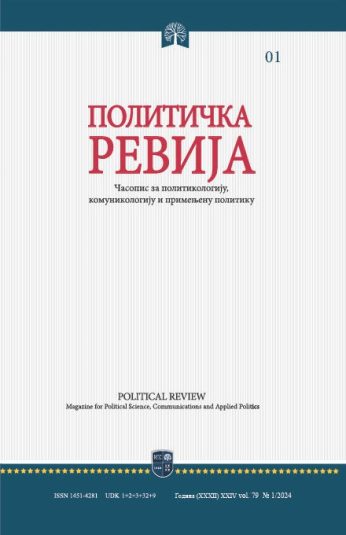Тема броја
ММФ И НАЦИОНАЛНА ЕКОНОМИЈА
УТИЦАЈ МЕЂУНАРОДНОГ МОНЕТАРНОГ ФОНДА НА ПОЛИТИЧКЕ ПРОЦЕСЕ У ДРЖАВАМА ЧЛАНИЦАМА
Сажетак
Кредитни аранжмани Међународног монетарног фонда имају економске и политичке импликације на државе чланице. Структура чланства, као и начин одлучивања у Мeђународном монетарном фонду омогућују формалне и неформалне утицаје најважнијим индустријским земљама, а посебно Сједињеним Америчким Државама. Услови кредита утичу на политичке процесе у земљама чланицама у правцу промена економског и политичког система, стимулисања или спречавања формирања опозиционих ставова или подршке ауторитарној власти, ради одржања унутрашње или регионалне стабилности. Услови Међународног монетарног фонда мењају понашање у спољној политици држава чланица у правцу усаглашавања са политиком Сједињених Америчких Држава и других индустријски развијених држава, којима се одражавају њихови геополитички циљеви.
Референце
- Blackmon, P., “The IMF: A New Actor in Foreign Policy Decision Making“, у: Proceedings of the 41st Annual Convention of the International Studies Association, 14-18 March 2000. Los Angeles: рр. 1-16.
- Broz Lawrence and Michael Brewster Hawes, US domestic politics and International Monetary Fund policy, Annual Meeting of the American Political Science Association, Philadelphia, August 28-31, 2003.
- Brown Chelsea, „Democracy’s Friend or Foe? The Effects of Recent IMF Conditional Lending in Latin America“, International Political Science Review (2009), Vol. 30, No. 4, pp. 431-457.
- Calomiris, Charles W., „The IMF’s Imprudent Role as a lender of Last Resort“, Cato Journal, Vol. 17, No. 3, Winter 1998, pp. 275-294.
- Caraway, Teri L., Stephanie J. Rickard and Mark S. Anner, „International Negotiations and Domestic Politics: The Case of IMF Labor Market Conditionality“, International organization, Volume 66, Issue 1, January 2012.
- Copelovitch, Mark: Master or Servant? Agency Slack and the Politics of IMF Lending, Department of Political Science & La Follette School of Public Affairs University of Wisconsin-Madison, November 2006.
- Dreher, A., et al., „Global horse trading: IMF loans for votes in the United Nations Security Counci“l, European Economic Review, 2009.
- Dreher, Axel and Jan-Egbert Sturm, Do IMF and World Bank Influence Voting in the UN General Assembly?, April 2006.
- Dreher, Axel, Jan-Egbert Sturm, James Raymond Vreeland, „Does membership on the UN Security Council influence IMF decisions? Evidence from panel data“, CESIFO Working Paper, No. 1808, September 2006.
- Griffiths Jesse and Konstantinos Todoulos, Conditionally yours: An analysis of the policy conditions attached to IMF loans, EURODAD, April 2014.
- Henning, Randall C., „US Interests and the International Monetary Fund“, Peterson Institute for International Economics, Policy Brief, No. PB 09-12, June 2009.
- IMF, Republic of Serbia: Letter of Intent, and Technical Memorandum of Understanding, December 9, 2010, Washington, DC.
- Kentikelenis, Alexander, Thomas H. Stubbs and Lawrence P. King, „IMF conditionality and development policy space, 1985-2014“, Review of International Political Economy, 2016.
- Landler, Mark, „Trump Threatens to End American Aid: ‘We’re Watching Those Votes’ at the U.N.“, The New York Times, 20. 12. 2017.
- Martinez-Vazquez, Jorge, Felix Rioja, Samuel Skogstad and Neven Valev, „IMF Conditionality and Objections: The Russian Case“, The American Journal of Economics and Sociology, Vol. 60, No. 2 (Apr., 2001), pp.501-517.
- Myers, Robert John: The Political Morality of the International Monetary Fund, Ethics and Foreign Policy, Vol. 3, Тransaction Books, New Brunswick, NJ, 1987.
- Moschella Manuela and Catherine Weaver, eds., Handbook of Global Economic Governance – Players, power and paradigms, Routledge, London, 2014.
- Momani, Bessma, „American politicization of the International Monetary Fund“, Review of International Political Economy, Vol. 11, No.5, December 2004, pp. 880-904.
- Oatley, Thomas and Jason Yackee, „American Interests and IMF Lending“, International Politics, 2004, 41, pp. 415-429.
- Reynaud, Julien and Julien Vauday, „IMF Lending and Geopolitics“, ECB Working Paper Series, No. 965, November 2008.
- Stiglitz, Joseph E., Globalization and its Discontents, W.W. Norton, New York, 2002.
- Stiles, Kendal W., „IMF Conditionality: Coercion or Compromise?“, World Development, Vol. 18, No.7, 1990, pp. 959-974.
- Takagi, Shinji,| International Monetary Fund, Independent Evaluation Office: The IMF and the crises in Greece, Ireland, and Portugal, Washington, DC: International Monetary Fund, 2016.
- Thacker, Storm C., „The High Politics of IMF Lending“, World Politics, 52, October 1999.
- Vreeland, James Raymond: Institutional determinants of IMF Agreements, Yale University, Department of Political Science, New Haven, 28 September 2001.
- Vreeland, International and Domestic Politics of IMF Programs, Reinventing Bretton Woods Committee and World Economic Forum conference on The Fund’s Role in Emerging Markets: Reassessing the Adequacy of its Resources and Lending Facilities. Amsterdam, November 18-19, 2004.
- Williamson, John, „Democracy and the ‘Washington Consensus’”, World Development, Vol. 21, No. 8, 1993, pp. 1329-1336.

